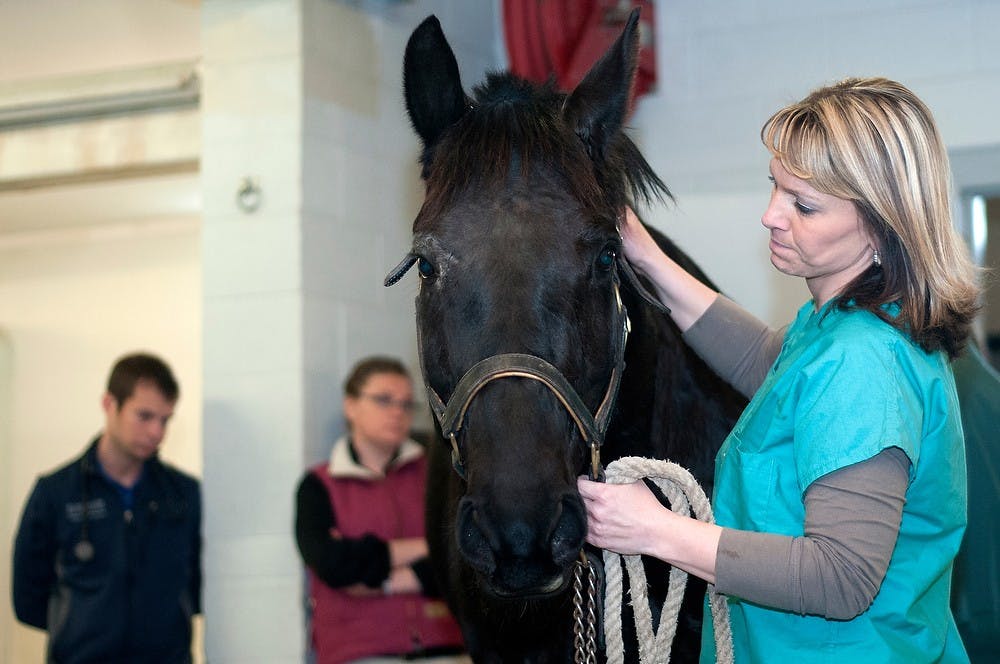When long-time MSU Veterinary Medical Center client Cory Russell trailered her horse Ben to East Lansing from her home in Chelsea, Mich., for surgery, she had little hope he would pull through.
“He was (laying) down in the trailer on the ride up there and the vet said to me, ‘Cory, it’s not looking good. I need to warn you,’” she said.
After Russell arrived at the hospital, Ben got up and walked out of the trailer and into the exam room before he laid back down on the ground. The veterinarian immediately sent him into emergency surgery.
A team of surgeons performed a major abdominal surgery on the horse, which was successful. Ben made a full recovery.
Russell and other large animal owners have placed their trust in the center, which continues to rise in national rankings and bolster its reputation as one of the best veterinary destinations in the country.
National reputation
In the most recent rankings by U.S. News & World Report, MSU’s Veterinary Medicine program was ranked No. 9 in the country. They earned the ranking in part because of advanced technology that many other programs do not have.
In Russell’s case, their equipment and expertise led to a quicker diagnosis.
“I had my horse seen by two veterinarians in the area and no one could figure out what was wrong with him,” Russell said. “I sent him up to Michigan State and they diagnosed him within an hour and that was because they had all the tools to do it.”
Unlike many other veterinary hospitals, MSU’s has 24-hour care and intensive care. They also have a 3 Tesla magnet for MRI scans, said chief of staff of the large animal hospital Elizabeth Carr, D.V.M. The machine has a more powerful magnetic field as opposed to a 1.5 Tesla magnet MRI scan, producing higher quality imaging.
The hospital has a neonatal intensive care unit, a gastrointestinal intensive care ward and an isolation facility for horses with contagious diseases, said Carr, who is also a diplomate in the American College of Veterinary Internal Medicine and a diplomate in the American College of Veterinary Emergency and Critical Care.
The facility also features imaging services such as digital radiography, digital fluoroscopy, ultrasonography, CT and nuclear scintigraphy, which is a bone scan.
Acupuncture and physiotherapy are just a few more of the many services offered at the Veterinary Medical Center.
Immersive programs
Being a veterinarian is like being a medical doctor, except the patients they see can’t tell their doctors what’s wrong,
Second-year veterinary medicine student Rachel Wright said one feature that drew her into the program is that they have a veterinary hospital within the veterinary school, which gives students hands-on opportunities to learn at the clinic.
Experts train residents, interns and veterinary students year-round in the facility to give additional insight.
“The nice thing about it is you’re not just dealing with one veterinarian,” Russell said. “You’re dealing with a wealth of resources as far as your vets, your residents, your interns and your students. It’s about having all the resources and all the diagnostic tools.”
As a student with a primary interest in equine medicine, Wright said her favorite class is one she is currently taking dealing with equine sports medicine. She said being in the process of completing the dream she has been striving for since she was a little girl keeps her motivated while working her way through the intense program.
Studies with value
Support student media!
Please consider donating to The State News and help fund the future of journalism.
Veterinary medical school is a four-year program where the first two-and-a-half years are spent in the classroom.
The students learn a very similar curriculum up until their last 18 months in the program. At that time, they branch off and rotate through various clinical services where they focus on their specific interests in the field, Wright said.
Students work with animals such as dogs, cats, hamsters, guinea pigs, snakes, birds, horses, cattle, goats, sheep, potbelly pigs, alpacas and llamas, Carr said.
After students in veterinary medicine graduate and pass national and state boards, they are qualified to practice on any species, Carr said.
“One of the beauties of the field is that you can focus as much as you want or be as broad as you want,” she said. “The value of it is if you decide at some point you want to pursue another area of interest you’re licensed in all species.”
For those interested in learning more about veterinary medicine, the college puts on an annual event called Vet-A-Visit.
The event will be held on Saturday, April 5 from 9 a.m. to 3 p.m. Those who attend will have the opportunity to see both the large and small animal clinics and several different animals.
There also will be presentations and round-table discussions for students interested in becoming a licensed veterinary technician or a doctor of veterinary medicine.
Editor's note: Due to an editing error, this article was changed to accurately reflect Dr. Carr's position as a diplomate of the American College of Veterinary Internal Medicine.
Discussion
Share and discuss “Vets of a different breed” on social media.







